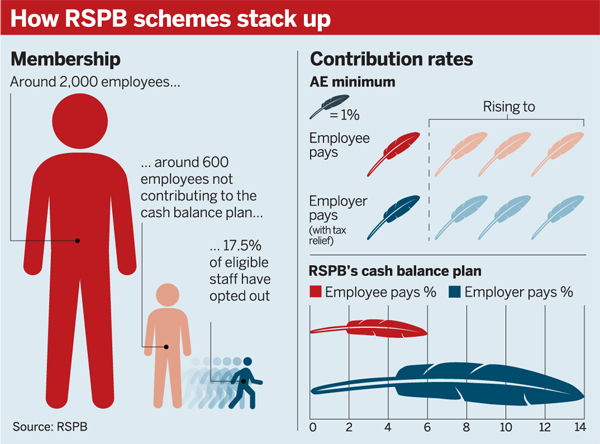The bird protection charity RSPB has revealed a 17.5 per cent opt-out rate since auto-enrolment in November, as smaller organisations start to push up the proportion of workers declining workplace saving.
There has been concern in the industry that employers with low-paid workforces or a significant proportion of temporary or part-time contracts will see greater opt-outs than the early average of around 9 per cent reported in official figures.
Giving the project wings
The RSPB made an early decision to set up a project team to carry through the auto-enrolment project.
“Our way of handling it was not just to add it onto somebody’s day job,” said Drew. “We appointed a project manager to deal with it, a project board to deal with it and ran it as a separate project. And that would be my advice to anybody starting this process.”
The charity began discussions around 18 months ahead of its August 2013 staging date, and decided to postpone the rollout by three months.
It employed a consultancy to help find a provider, and chose Now Pensions in part due to its track record with similar organisations.
“We were looking at people who had experience of working with charities, would provide us with support we needed,” said Drew. “Our time was already taken up looking after the in-house pension scheme. So we wanted someone who could give us support on the communications side and do as much of the processing as possible.”
It began a communications drive in April, directing staff towards Now Pensions and the Pensions Regulator for further information.
“We tried as much as we can to push people towards the provider because, again like most charities we’re limited in our internal resources,” said Drew. “But yes we have had quite a lot of calls and questions.”
RSPB's disengagement rate is still below what the government was predicting as the reform kicked off. In 2012, an official survey found 15 per cent of people were planning to opt-out, with a further 14 per cent undecided.
“Some people are really interested in pensions and others aren’t,” said Sharon Drew, the charity’s pensions manager. “It’s not really [the workers’] primary concern, as you would expect with an organisation like the RSPB. So we’ve had a fairly mixed response.”
The charity had a cash balance scheme in place and it sought a low-cost auto-enrolment scheme to cover the around 600 of its workers not already contributing to the plan.
In the cash balance scheme, the employee pays 6 per cent of pensionable salary while the employer pays 14 per cent. The defined contribution scheme used for auto-enrolment is currently set at the statutory minimum, starting at 1 per cent for each party.
RSPB’s workforce profile meant its choice was limited to around four providers. It settled on Now Pensions. Drew added a lack of internal resource meant getting provider support on communications and processing was a key goal, with investment strategy less of a priority.
“[Investment] was one of the things we considered but I wouldn’t say we paid a lot of attention to it,” she said.
John Reeve, senior consultant at Premier Pensions, said removing the administrative burden of auto-enrolment was often more important to smaller employers than investment strategy and was a driver for them choosing big-brand mastertrusts.
“It is the easy option,” he said. “[Employers] are impressed by Nest’s ability to help them through the process but haven’t really considered the investment side at all.”
Now Pensions’ CEO Morten Nilsson said the lower average salaries in the charity sector meant employers are “mindful” to find low-cost auto-enrolment products, but investment strategy was still a priority.
But he added that budgetary pressures have rendered administration a top priority for charities.
“Employers in this sector want to find a balance,” he said. “They want a scheme which is going to be cost-effective and easy for them, but they also want to ensure they provide a high-quality pension for their employees.”


















